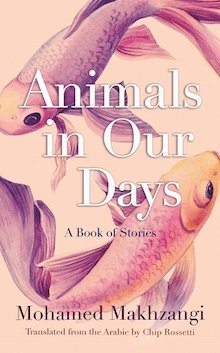 From Syracuse University Press | Animals in Our Days by Mohamed Makhzangi, translated from the Arabic by Chip Rossetti | Fiction | 202 pages | ISBN 9780815611486 | US$17.95
From Syracuse University Press | Animals in Our Days by Mohamed Makhzangi, translated from the Arabic by Chip Rossetti | Fiction | 202 pages | ISBN 9780815611486 | US$17.95
What the publisher says: “Each story in Mohamed Makhzangi’s unique collection Animals in Our Days features a different animal species and its fraught relationship with humans—water buffalo in a rural village gone mad from electric lights, brass grasshoppers purchased in a crowded Bangkok market, or ghostly rabbits that haunt the site of a long-ago brutal military crackdown.”
What Marilyn Booth says: “The stories are intricate political commentaries on Egypt’s recent history, but they also range across the post-colonized world; the history of violent imperial conquest and encounter is prominent. Myriad kinds of domination and greed are beautifully sketched, with a deep sympathy as well.”
What I say: “Dozens, hundreds—some went so far as to claim thousands—of bright, dazzlingly white rabbits” arriving in a public square is the image at the heart of this book’s “Enchanted Rabbits.” But that pastoral image ends up in an unlikely juxtaposition with authoritarian tendencies and revolutionary imagery. That’s par for the course with this collection, in which animals bring disparate elements together in unexpected ways.
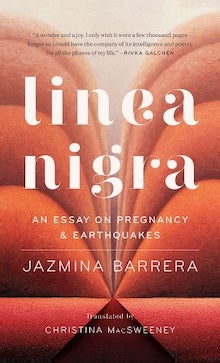 From Two Lines Press | Linea Nigra by Jazmina Barrera, translated from the Spanish by Christina MacSweeney | Nonfiction | 184 pages | ISBN 9781949641301 | US$21.95
From Two Lines Press | Linea Nigra by Jazmina Barrera, translated from the Spanish by Christina MacSweeney | Nonfiction | 184 pages | ISBN 9781949641301 | US$21.95
What the publisher says: “An intimate exploration of motherhood, Linea Nigra approaches the worries and joys of childbearing from a diverse range of inspirations and traditions, from Louise Bourgeois to Ursula K. Le Guin to the indigenous Nahua model Luz Jiménez. Part memoir and part manifesto, Barrera’s singular insights, delivered in candid prose, clarify motherhood while also cherishing the mysteries of the body.”
What Publishers Weekly says: “Along the way, Barrera draws on the work of such writers as Adrienne Rich and Rivka Galchen, artists including Frida Kahlo, and photographer Tina Modotti. Barrera’s voice is meditative, bolstered by poetic turns of phrase, precise language, and fresh metaphors.”
What I say: Jazmina Barrera’s new book is subtitled “An Essay on Pregnancy and Earthquakes,” and to a reader first encountering this book, those two subjects might seem light-years apart. One of the more impressive accomplishments of this book is to make these two elements overlap in a surprising manner. Throw in musings on literature, art, and familial names, and you have a thoroughly compelling work.
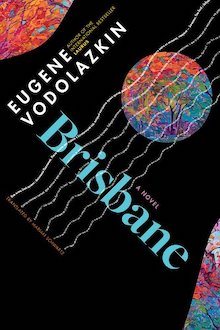 From Plough | Brisbane by Eugene Vodolazkin, translated from the Russian by Marian Schwartz | Fiction | 343 pages | ISBN 9781636080451 | US$26.99
From Plough | Brisbane by Eugene Vodolazkin, translated from the Russian by Marian Schwartz | Fiction | 343 pages | ISBN 9781636080451 | US$26.99
What the publisher says: “After Gleb Yanovsky, a celebrated guitarist, is diagnosed with Parkinson’s disease at age fifty, he permits a writer, Sergei Nesterov, to pen his biography. For years, they meet regularly as Gleb recounts the life he’s lived thus far: a difficult childhood in Kyiv, his formative musical studies in St. Petersburg, and his later years in Munich, where he lives with his wife and meets a thirteen-year-old virtuoso whom he embraces as his own daughter.”
What translator Marian Schwartz says: “Today, we inevitably think about the languages in question, Russian and Ukrainian, as emblematic of two countries now at odds. As the news has unfolded, Vodolazkin’s depiction of these two languages as part of one and the same person, as brothers and foes simultaneously, while not completely new for me, has introduced more nuance into my thinking.”
What I say: There’s a lot going on in Brisbane, from the life story of the acclaimed musician at this novel’s center to his complex and moving familial history. What’s especially interesting here is the way in which said protagonist’s life spans a complex geopolitical time, from his Soviet-era upbringing to his family’s relationship to the conflict between Russia and Ukraine. There’s a lot to ponder here.
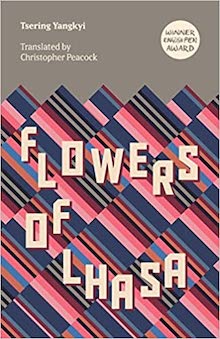 From Balestier Press | Flowers of Lhasa by Tsering Yangkyi, translated from the Tibetan by Christopher Peacock | Fiction | 208 pages | ISBN 9781913891220 | US$16.99
From Balestier Press | Flowers of Lhasa by Tsering Yangkyi, translated from the Tibetan by Christopher Peacock | Fiction | 208 pages | ISBN 9781913891220 | US$16.99
What the publisher says: “Tsering Yangkyi’s novel paints a vivid portrait of Lhasa, Tibet’s cultural and religious capital. This is a holy city where thousands of pilgrims daily circumambulate the Potala Palace and the Jokhang Temple, but it is also a modern city, with all the problems of the modern world. While immersing us in the vibrant uniqueness of Tibetan life, Flowers of Lhasa also paints a haunting picture that deals with global and timely concerns.”
What The World of Chinese says: “A long-term Lhasa resident, Tsering Yangkyi paints a vivid portrait of her city, both ancient and highly modern. This novel follows the story of three Tibetan and one Han Chinese women, migrant workers who’ve traveled to Lhasa in search of a better life.”
What I say: Told through a series of episodes, Tsering Yangkyi’s novel offers a thoroughly lived-in portrait of several residents of the city of Lhasa, and the difficult and occasionally harrowing circumstances in which they find themselves. All told, Flowers of Lhasa is a powerful work about desperation and community.
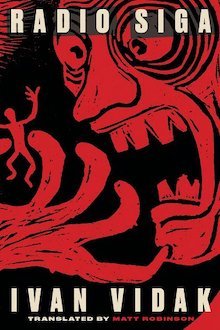 From Sandorf Passage | Radio Siga by Ivan Vidak, translated from the Croatian by Matt Robinson | Fiction | 200 pages | ISBN 9789533513706 | US$19.95
From Sandorf Passage | Radio Siga by Ivan Vidak, translated from the Croatian by Matt Robinson | Fiction | 200 pages | ISBN 9789533513706 | US$19.95
What the publisher says: “Set in World War II Yugoslavia, Radio Siga transmits the story of Kalman Gubica, a hard-drinking but well-meaning layabout who is forever changed after being struck by lightning. Haunted by the voice of his long-dead father, Kalman struggles to find meaning in his life.”
What Publishers Weekly says: “Though long descriptions of military maneuvers weigh down the story, Vidak makes hay of Kalman’s farcical antics, which evoke Czech writer Jaroslav Hašek’s The Good Soldier Švejk. Overall, this is an enjoyable romp.”
What I say: Fiction set against the backdrop of war often abounds with ever-shifting moods and haunted characters, and Radio Siga is no exception. Much of what stands out about Ivan Vidak’s work in Radio Siga is the way that protagonist Kalman’s eccentricities curdle into something more sinister as the novel progresses. It’s a difficult tonal balance to pull off, but Vidak succeeds.
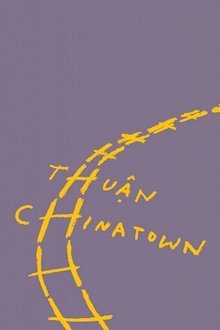 From New Directions | Chinatown by Thuân, translated from the Vietnamese by Nguyễn An Lý | Fiction | 192 pages | ISBN 9780811231886 | US$16.95
From New Directions | Chinatown by Thuân, translated from the Vietnamese by Nguyễn An Lý | Fiction | 192 pages | ISBN 9780811231886 | US$16.95
What the publisher says: “An abandoned package is discovered in the Paris Metro: the subway workers suspect it’s a terrorist bomb. A Vietnamese woman sitting nearby, her son asleep on her shoulder, waits and begins to reflect on her life, from her constrained childhood in communist Hanoi, to a long period of study in Leningrad during the Gorbachev period, and finally to the Parisian suburbs where she now teaches English.”
What Kirkus Reviews says: “At the heart of this novel is a single mother unable to let go of the memory of her former husband, Thụy, and her conviction that their marriage back in Vietnam was doomed from the start due to the clash between their cultural backgrounds.”
What I say: Nestled narratives, memory, and psychogeography all converge in Thuân’s dense, allusive novel Chinatown. Told in a series of lengthy, headlong paragraphs, this book spans decades and offers an immersive sense of the different locations in which it’s set. Thuân incorporates a host of intriguing digressions into the mix, from the fiction of Marguerite Duras to the effects of duck fat. It’s a resonant work that brings together everything from geopolitics to fraught familial dynamics.
Copyright © 2022 Tobias Carroll. All rights reserved.
Looking for more reading suggestions? Check out Tobias Carroll’s recommendations from last month.
Disclosure: Words Without Borders is an affiliate of Bookshop.org and will earn a commission if you use the links above to make a purchase.










